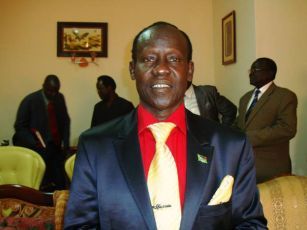“Never surrender” parliamentary speaker tells South Sudan
April 25, 2012 (JUBA) – The speaker of South Sudan’s parliament on Wednesday called for nationwide youth mobilisation and recruitment into the country’s army, encouraging the young nation not to “surrender” or “retreat”, as it faces the worst military confrontation with neighbouring Sudan since partition last year.

A war of words has broken out mirroring the fighting on the ground over a disputed oil-producing region – Heglig.
On Monday a leading figure in South Sudan’s ruling party, Sudan People’s Liberation Movement (SPLM), responded to Sudanese president Omar al-Bashir describing them as “insects” that must be crushed last week, by saying that the government in Khartoum was like a “Mosquito that bites and takes human blood”.
Bashir also said on a visit to Heglig oil field which the Sudan Armed Forces (SAF) reclaimed on 20 April, after South Sudan’s had occupied it for 10 days, that the South Sudan must be “liberated” from the SPLM. He expressed regret that Khartoum had allowed South Sudan to become independent with the SPLM in power in Juba.
“One of us has to go” he said before adding that our “dialogue with these people will be through the gun because they only understand the language of the gun.”
South Sudan’s Kiir on a visit to China this week has said that Bashir’s comments and aerial attacks that have killed civilians in Unity State amount to a declaration of war.
The speaker of South Sudan’s parliament, James Wani Igga, issued a statement on Wednesday saying that in his opinion Sudan had “officially declared war on South Sudan”.
It was Wani, who in the presence of Kiir and Bashir, read out South Sudan’s declaration of independence in Juba on 9 July 2011. At the time Bashir promised brotherly relations with its former province but a host of unresolved issues were not addressed and relations have deteriorated, reaching a nadir this week.
Both countries have launched nation-wide recruitment campaigns to bolster their armed forces in preparation for a potential full-scale conflict. So far, the fighting has mainly been around contested areas along the largely un-demarcated but oil-rich 1,800 kilometer border.
On Wednesday the African Union laid out a road map for peace between the East African neighbours.
Field Marshal Bashir has held a series of rallies in the run-up and after the fall of Heglig to his forces. Juba, however, denies they were routed from the area and maintains that it left on its own volition to comply with demands from the international community.
On his Monday visit to inspect the damage to Heglig’s oil facilities Bashir promised to teach South Sudan a “final lesson” and award them a “doctorate in treachery, perfidy and cowardice.”
President Bashir told troops that Heglig’s vultures “have been well fed and are relaxing in the shade under the trees”. SAF claim they killed over 1,000 SPLA soldiers but this is denied by Juba.
“They talks about war in every rally they hold in Sudan”, Igga said on Wednesday.
Juba’s rhetoric has been less emotive that Khartoum’s. The strongest reaction coming from the SPLM’s Deputy Secretary General Anne Itto.
Responding to Bashir’s repeated description of her party as “insects”, she described his National Congress Party (NCP) in Khartoum as a “Mosquito that bites and makes noise gratuitously even though it has taken human blood and injected parasites.”
With both sides reported to be amassing military personnel, hardware and ammunition on the border, South Sudan has stepped up its army recruitment drive.
Igga urged South Sudan’s youth to “never surrender” but rather take the courage to mobilise themselves for training to defend the country as they did during the (1983-2005) civil war between the SPLM and various Khartoum governments.
“I have always believed and trust with confident that the future of this country lies in the hand of young people. I believe they will stand shoulder to shoulder with the leadership of this country”, said Igga.
The senior SPLM politician, quoting a slogan often used by youth demonstrating against external aggression, said: “Never surrender, never retreat, victory is certain.”
He called on youth to reconcile their differences and work together to defend the country from external threats. “Our youth needs to be organised and be united. The future of this country lies in their hands and can never get it if they don’t work together”, he said.
Fighting between rival cattle herding groups in Jonglei State in particular has been a major security issue for the nine-month-old country. Last year 1,000 people died in raids and counter attacks between Jonglei’s ethnic groups, with 100,000 displaced by another spike in violence over the New Year.
South Sudan’s deputy director of military intelligence, Mac Paul, on Tuesday said his sources indicated that “the Sudanese army is mobilising for a push on Bentiu”, the capital of oil-rich Unity State.
The UN says that Sudanese bombs have killed two 14 year-old-boys at a market in Unity State and the SPLA have accused SAF of also carrying out ground attacks. Khartoum denies entering South Sudanese territory.
“Never allow this country to be invaded again”, Igga said.
“Our youth have always said never surrender. This is the time for them to say it and rally behind the leadership of this country. At the end of everything else, we will not remember the words uttered by the enemies against us but will remember the silence of our friends during these difficult times,” he added.
Juba has been unhappy that after it heeded international calls to withdraw from Heglig, Khartoum has been able to launch further ground and air assaults of the border. The SPLM has called for more pressure be put on Khartoum to stop its bombing campaign and return to negotiations.
Igga described withdrawal of the country’s troops from Heglig – known as Panthou in South Sudan – as “difficult and painful decision”. It was necessary “for the interest of the country”, he said.
(ST)
